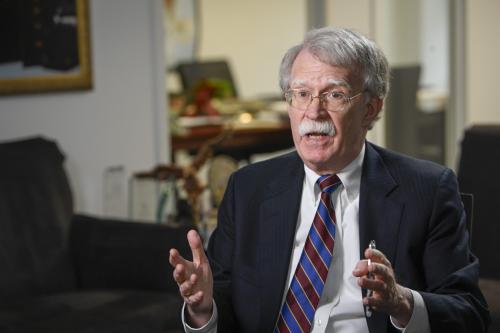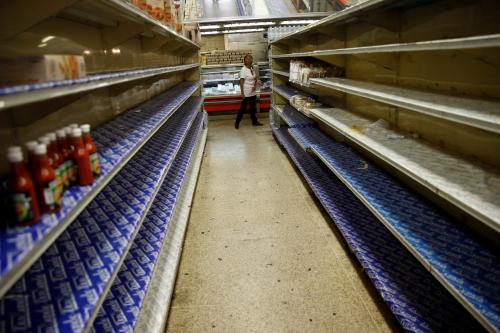On February 26, 2019, Marcela Escobari testified before the U.S. House of Representatives Committee on Foreign Affairs. Her written testimony on the humanitarian crisis in Venezuela and options for the U.S. policy response follows. View the full hearing.
Chairman Sires, Ranking Member Rooney, and Members of the Committee,
Thank you for convening this important hearing on The Humanitarian Crisis in Venezuela and U.S. Policy Responses.
I am grateful for the opportunity to participate in this hearing. I have devoted my career to international development. I have worked advising countries on how to spur economic growth that is inclusive and built the capacity of governments to work more effectively and promote the use of evidence in the delivery of programs in education, health, and economic development. I spent almost a decade as executive director of an international development research center at Harvard University, and most recently served as Assistant Administrator for the Bureau for Latin America and the Caribbean (LAC) at the United States Agency for International Development (USAID), until January 2017. During my time at USAID, the LAC Bureau oversaw the response to Hurricane Matthew in Haiti, strengthened our Central American operations to tackle poverty and insecurity, and supported the Colombian government through its peace process and reintegration efforts of former guerillas. During my time at USAID, we also developed a strategy on how to respond to the growing humanitarian crisis in Venezuela, exploring the options of assistance under different scenarios.
Venezuela presents a complex situation for a humanitarian response—where there is a legitimate, widely-recognized, and democratically-elected entity in the National Assembly, and its leader, Juan Guaidó, who was sworn in as interim president. However, he does not, as of now, have the command of the military forces or the government bureaucracy. So, while there has been an official request of humanitarian aid from the National Assembly and a response from the multilateral community, it is a contested environment, where the delivery of aid is being explicitly blocked by Nicolas Maduro and the military.
The stakes could not be greater for Venezuela. A man-made crisis due to corruption, repression and incompetence has plunged a once-prosperous country to the brink of starvation and destitution. The regime overseeing this disaster remains in place through military force and political repression.
The U.S. joins over 50 countries, led by the Lima Group of Latin American nations and Canada, and most of the European Union, in their support for Juan Guaidó as interim president and calls for an expedient democratic transition through elections. The current U.S. government strategy appears to seek to exert maximum economic and political pressure on the regime, while the interim president Juan Guaidó promotes an Amnesty Law encouraging the military to abandon Maduro. As this strategy plays out, the U.S. government should project an unwavering commitment to helping the people of Venezuela, provide humanitarian aid in the immediate term, and prepare for larger scale engagement to stabilize and restore hope for millions of Venezuelans.
Alleviating the human suffering and the refugee crisis looks different under the status quo and under a critically needed change of government.
The current situation suggests a two-tiered response:
- During the current impasse, we need to deliver aid in a politically neutral way to those most in need. This may involve funding existing local and multinational NGOs on the ground and providing vital medicines through existing channels. The U.S. government and allied nations should think creatively about a variety of delivery channels, from cash transfers to airdrops of supplies looking at all available channels, as the need is and will be massive. Let’s be clear, that while important and necessary given the extent of the humanitarian crisis, this approach is palliative.
- In the case of a democratic transition, Venezuela can engage in the profound reforms that are needed: stabilization of the currency, rebooting the private provision of goods, massive cash transfers to alleviate acute shortages among the poor, the replenishment of hospitals and clinics, and the provision of citizen security.
What I hope to cover in this testimony is:
- What is the humanitarian situation in Venezuela?
- How did we get here?
- What does a recovery plan involve?
What is the situation in Venezuela?
In deciding how to move forward with conviction, it is important to understand how we got here, and the conditions on the ground today.
Venezuela has seen one of the most dramatic economic contractions in human history, more so considering that this has been a man-made disaster, outside of a war zone (even if the statistics resemble a war zone).
Economy
Inflation has surpassed over 1 million percent in the last year. This means that if Venezuelans used to be able to buy a carton of milk for $1, now it costs them $10,000. Obviously, salaries have not kept up with this inflation. The minimum salary (six years ago in 2012) used to cover 2000 daily calories, and now it buys 600. In other words, a daily salary for a Venezuelan does not buy two eggs.
GDP (gross domestic product) has contracted over 50 percent in the last five years, the largest contraction in the world in 2017. Venezuela has over $150 billion in debt, which is over five times its exports. In the country with the largest oil reserves in the world, output has gone down 64 percent since 1999, from 3.5 million barrels per day to 1.2 million barrels per day due to mismanagement and corruption.
Poverty has gone from 48.4 percent in 2014 to 91 percent in 2017. This is measured by ENCOVI, an academic effort by Venezuelan universities to replicate the standard household survey, after the national statistical agency stopped measuring poverty for political reasons. Six out of 10 Venezuelans have involuntarily lost 19 pounds in one year, and 1.3 million people suffer from malnutrition.
Health
There are shortages of almost every basic medication, and hospitals have less than 30 percent of the needed stock of medication. In 2015, the Ministry of Health reported a 100-fold increase in neonatal deaths in the last three years due to lack of basic infrastructure. We have seen the rise of diseases previously eradicated, according to the Center for Disease Control (CDC). In the case of malaria, Venezuela was one of the first countries to eradicate it, and now it is back with a vengeance, with over 500,000 cases, and it already has claimed 820 lives as of June 2018.
Zika, polio, diphtheria (particularly affecting the Andean region), measles, which are primarily affecting indigenous populations, are all diseases whose prevalence has skyrocketed. Diseases do not respect borders. The rise of these diseases poses a national security threat throughout the region. Shortage of vaccines means that this problem is likely to aggravate and spread given the refugee crisis.
According to the U.N. agencies, 3.4 million Venezuelans have left their country, with 2.7 million having left since 2015. An average of 5,000 people cross the border every day, mostly to Colombia.
Security
Venezuela is one of the most violent countries in the world, at 89 homicides per 100,000 individuals, with 26,000 violent deaths in one year. It has a repressive government that in the last month has killed over 40 people and detained 800, including minors, who have been charged with terrorism.
At the same time, there is a state of lawlessness in the country. To keep the loyalty of the army, the government has given them control of the ports, customs, borders (giving them access to bribes and narcotrafficking). Parts of Venezuela have become lawless refuge for the FARC/ELN and non-state actors to engage in illegal mining, narcotrafficking and contraband of gasoline. It is presumed that the military sells illegally over 100,000 barrels per day to Colombia, which is money (between $2 billion and $3 billion) not spent on the needs of the Venezuelan people.
How did Venezuela get here?
Venezuela sits on the largest oil reserves in the world, and for decades was the wealthiest country in Latin America. The Venezuelan collapse is a story of mismanagement and corruption. The economy has suffered from a decade of expropriations, underinvestment in the oil industry, massive foreign indebtedness and the gradual undermining of institutions overseeing government expenditures.
The expropriation and nationalization of companies in every sector from oil to agriculture have led many companies to shut down, leading to shortages and price hikes for almost all basic necessities. The oil boom of 2004-12 was misused to fund consumption through imports while dismantling the productive capacity of the country.
As oil production declined by lack of investment and mismanagement, and without the exports to attract foreign exchange, the government started to print money to finance purchasing power. Instead of investing in PDVSA, the national oil company, which comprises 95 percent of Venezuelan exports, it used its proceeds to pay its cronies and political elite in exchange for loyalty and subsidize food. The regime uses stockpiles of food in exchange for political loyalty, but even that is only reaching less than 30 percent of the population.
Unable to fund the subsidies and social programs, Maduro has continued to print money, driving up inflation and making products unaffordable for average Venezuelans. He instituted price controls and fixed the exchange rate (giving preferential rates to his allies). Lack of foreign exchange has impaired the capacity of the domestic productive apparatus to produce, making goods scarce, and goods more unaffordable. This cycle has predictably spiraled out of control leading to the humanitarian crisis through a mix of a scarcity of medication and food, weakened markets—and the crime and lawlessness that scarcities have fueled.
What can be done to alleviate the humanitarian crisis?
Venezuela was once an upper middle-income country with a thriving private sector made up of local and international firms. The goal of any transition effort would be to restore market mechanisms for the provision of goods and services and provide massive humanitarian relief to the most vulnerable segments of the population during a transition period.
There are two current scenarios that the U.S. government should be prepared for:
I. Status quo
Where the National Assembly and interim president Guaidó has requested aid but does not yet have the support of the military nor government distribution apparatus at its disposal. In coordination with the ever-growing international community pledging aid, the U.S. government should explore all ways to supply the most critical aid to the most vulnerable sectors of the population. Vital medicines for immunization, maternal-child health, mosquito borne diseases, and the most prevalent chronic, degenerative diseases are scarce or nonexistent and should be prioritized. Mechanisms for delivery include the multilateral organizations including the U.N. agencies like PAHO, UNICEF and global NGOs like the Red Cross, as well as local NGOs that are active in the country. The U.S. government can work with hundreds of NGOs currently on the ground, both local and international, and strengthen their capacity to support the most needed communities, which could come in the form of cash and goods. About 20 percent of imports are currently coming through the private sector so there are some goods that are available but not affordable for most of the population. For most other critical goods, they are either scarce or non-existent and should be delivered through all available channels, including air drops if the impasse prolongs itself. An equally robust effort should be deployed to help refugees in border countries to provide relief and limit their destabilizing effects on neighboring economies.
Consistent with best practices, delivery of aid should be neutral and apolitical. This involves avoiding the military and government mechanism that have historically used food to maintain control and loyalty, and also making sure any new aid goes to those most in need, irrespective of political affiliation, and through discreet channels.
This is a challenge in Venezuela, given that Maduro has historically rejected aid, and the political climate for aid has become more heated as Guaidó has openly challenged Nicolas Maduro’s legitimacy asking the military to switch allegiances, and called for new fair and free elections. The new PDVZA sanctions and the coalescing of international support for interim government have further put pressure on the Maduro government. It is further difficult to disentangle the humanitarian crisis and the political crisis, as they are deeply interconnected. The government policies have caused the humanitarian distress, and our ability to help are also hampered by the current regime.
In this tense and rapidly changing situation it is important to keep two principles present in the response:
- A focus on helping the Venezuelan people. On the humanitarian front this means using as much as possible the best practices in contested environment to get aid in apolitical, discreet ways, and being prepared to commit the resources that are commensurate with the need, which should be multiples of currently committed aid.
- Maintaining a multilateral approach. What makes this moment remarkable is the global support coalescing behind the interim president Guaidó and the humanitarian response. The Grupo de Lima (which includes Argentina, Brazil, Canada, Chile, Colombia, Peru, and Paraguay, among others), the OAS and most countries in the European Union make up the over 50 countries that have come together recognizing Guaidó and pressing for a democratic transition. Maintaining that multinational coalition, ideally led by the Grupo de Lima, will be crucial for the political reforms sought in Venezuela, as well as the humanitarian response and reconstruction of the country.
II. Under a democratic transition and new government in Venezuela
When there is a change in government, Venezuela will need to go through comprehensive reforms, and will require a concerted, and unified support of global players. Comprehensive reform will involve relaxing price and currency controls, reigniting productive capacity of companies to make goods and restoring property rights and credit to encourage investments. It will be critical to restructure the massive national debt to give Venezuela enough room to recuperate and invest in selected high priority sectors. It will be crucial to revive the oil industry through major foreign investments and restore expertise in the PDVZA company ranks. The recovery will also require what will likely be the largest IMF package in its history.
To tackle the humanitarian crisis would require a massive cash transfer to the poor that both matches and encourages the local provision of goods, and gets markets working again. This will restore the availability of goods, but also much needed jobs and sources of livelihood. Restocking hospitals and clinics with vaccines, critical medicines and capacity will also be important. It will also be important to support citizen security for the effective distribution of aid, and overall security of the population. In coordination with other funder countries, USAID should develop an intense 3-5-year transition program as the IMF funds are incorporated into the economic apparatus, and structural reforms restore credit and production. USAID’s programs should focus on the most vulnerable populations, whose savings and earnings have vanished, strengthen citizen security and support institutional strengthening.
To conclude, this is a moment where the question for all of us should be, how does the U.S. and international community maximize the chances of success of this full-on pressure strategy, so we can help Venezuela move from the palliative to the needed structural reforms required to restore prosperity to all Venezuelans.
The current government under Nicolas Maduro has consistently been willing to use the dwindling resources of the nation to enrich a corrupt political elite and buy loyalty to keep itself in power at the expense of the suffering and hunger of its people. The strategy of maximum economic and political pressure on the regime, including the recent U.S. sanctions on PDVZA, will make it hard for the Maduro government to continue to fund itself and press the military to defect, in what everyone hopes is a bloodless transition. As this strategy plays out, the U.S. government should project an unwavering commitment to helping the people of Venezuela, and to democratic principles of governance in unison with the growing global coalition of nations.
The strategy should also involve a humanitarian response–that is distinct from the political and diplomatic strategy- that complies with international law and the Geneva convention protocols, and that it is both neutral, apolitical and targeting those most in need.
Our unwavering support to the Venezuelan people in this critical moment, reinforces who we are as a country and what works when we use development and diplomacy to support stability and prosperity around the globe.
We are not passive in response to great suffering. Americans everywhere, from all faiths, are not idle when we see despair and trauma at this scale, when so many innocent lives are on the line. From local church groups, to philanthropy, to our support for U.S. government aid, when we see suffering, we do our part to help. We have been watching the demise of a great nation for over a decade. As humanitarian conditions reach crisis level, we can and must step up our response, consistent with our values as a free, prosperous and generous people.
We believe, and history has proven us right, that the security and stability of our neighbors makes us more prosperous. The crisis in Venezuela creates health, security, and geopolitical risks for the whole continent. We are stronger and wiser when we work with others. The challenges for Venezuela are and will be great, and will require the commitment, ingenuity and action of the multilateral coalition that has gained incredible momentum. The U.S. should act in concert with other countries.
I wish to sincerely thank the Subcommittee for your focus on the Venezuelan crisis and the humanitarian response and extending me the privilege of testifying today.




Commentary
TestimonyMade by Maduro: The Humanitarian Crisis in Venezuela and US Policy Responses
February 28, 2019